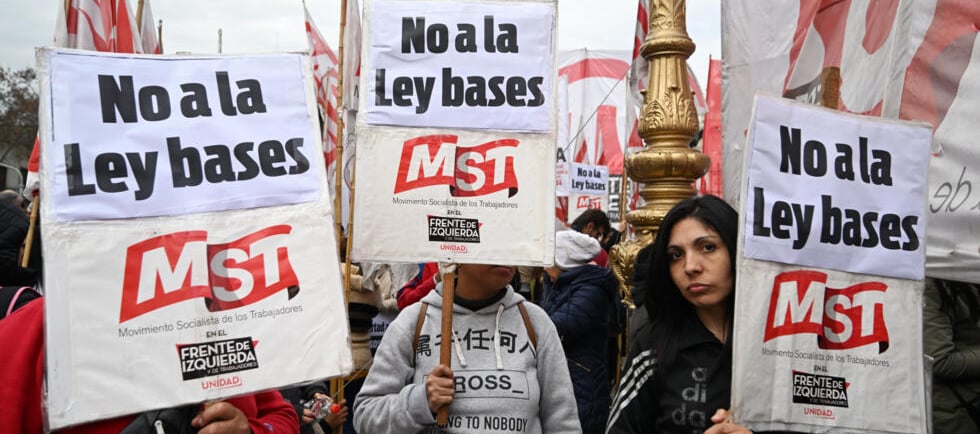Javier Milei's Radical Economic Reforms: A New Dawn or Deeper Peril for Argentina?
Javier Milei's presidency has ushered in a radical shift in Argentina's economic policies, with his sweeping reforms aimed at reducing state control, encouraging privatisation, and pursuing dollarisation. Will these drastic measures succeed in reviving Argentina's struggling economy, or will they further exacerbate the nation's existing challenges, particularly its significant debt burden?
ARGENTINA
Aisulu Sarmanova
8/23/20243 min read


Javier Milei shook the global political community with his electoral victory in December 2023, becoming the new President of Argentina and the first-ever libertarian leader in the country's history. In July 2024, the self-proclaimed anarcho-capitalist once again turned the world on its head, announcing a sweeping reform plan aimed at reviving Argentina’s ailing economy.
Milei’s libertarian ideas are embodied in his pursuit of an extreme reduction in government expenditure and minimal state interference in the free market. However, during the first six months of his presidency, Milei has faced considerable challenges in passing new legislative proposals through Parliament. The primary issue is the limited representation of his party, Avanza Libertad, within the legislative bodies: just 7 out of 72 seats in the Senate and 38 out of 257 in the Chamber of Deputies. Consequently, to implement his ambitious economic transformation, Milei must persuade his political opponents that his reforms will rescue Argentina from its dire economic situation.
Currently, over half of Argentina's population is classified as lower class, with Milei identifying inflation as the principal adversary. When Argentinians elected Milei as their president in December 2023, the inflation rate had already soared to 211%. By July 2024, it had reached a staggering 263%. In stark contrast, estimates place the inflation rate in the United Kingdom at 2.2% in July and 4% in December. Throughout his electoral campaign, Milei argued that the Central Bank of Argentina was responsible for what he termed the “inflation cancer” and proposed radical measures to dollarise the economy, eliminate the peso, and abolish the Central Bank altogether.
Recently, Milei succeeded in passing Law No. 27,742, known in Spanish as the “Ley Bases,” through the Argentine Congress. The Ley Bases encompasses a series of sweeping reforms designed to deregulate the economy, cut federal government spending, and further Milei’s anarcho-capitalist agenda. This legislation marks the beginning of profound changes to both the national and international economic landscapes of Argentina.
The new legislation embraces the fundamental principles of the free market, promising to create an environment conducive to extreme capitalism. Firstly, the Ley Bases mandates the massive privatisation of government-owned companies, such as Energía Argentina (ENARSA), which is involved in oil and gas exploration, distribution, and electricity generation; Belgrano Cargas y Logística and Sociedad Operadora Ferroviaria, which manage the country’s main freight and passenger rail networks; and Corredores Viales, a company holding concessions for multiple roads and highways nationwide. Furthermore, the large corporations slated for privatisation include Nucleoeléctrica Argentina, which operates Argentina’s three nuclear power plants, and Yacimientos Carboníferos Río Turbio, which runs the Río Turbio coal mine.
Secondly, the Ley Bases introduces an innovative incentive system for substantial investments, referred to as the "RIGI." The RIGI provides rewards for individuals or organisations initiating projects, including the ability to freely distribute products from these projects, with no preference for the local market. It also includes several exemptions from certain import and export taxes, as well as other regulations that allow for the free import of goods, without any obligation to use local providers unless dictated by market terms. The RIGI regime includes many other features that are highly appealing for international investments. However, it has not yet been fully ratified by Congress, and it may take a year for the RIGI to pass all the necessary legislative procedures. Nonetheless, RIGI stands as one of Argentina’s most ambitious projects to incentivise investment in its economy.
The complete transformation of Argentina’s political and economic landscape is not confined solely to privatisation and the encouragement of international investments. The Ley Bases grants the executive branch the authority to renegotiate agreements related to public infrastructure and associated services. It also introduces changes to the public infrastructure system, specifying that concessions can only be awarded through national or international public tender processes. Additionally, if the federal government agrees to make payments in US dollars, the law prohibits the government, as well as judges, from authorising payments in any other currency or method. The prioritisation of the dollar is a step towards aligning Argentina’s finances with a potential shift to a future currency. It is anticipated that Milei may follow the examples of Ecuador, El Salvador, and Panama, which have adopted the US dollar as their legal currency.
However, to dollarise Argentina’s economy, Milei may need to secure another loan from the International Monetary Fund (IMF). Argentina already owes the IMF over 30 billion US dollars, making it the most indebted country globally. Taking another loan from the IMF is a high-risk move that may not yield the desired results in the long term.
Javier Milei's presidency marks a radical shift in Argentina's economic and political landscape. His ambitious reforms, epitomised by the Ley Bases, aim to drastically reduce state control, encourage privatisation, and push for dollarisation, all in an effort to combat inflation and revitalise the struggling economy. While these reforms present significant opportunities for both international and national businesses, they also introduce substantial risks, particularly given Argentina's existing debt burden. Whether Milei's radical agenda will revive Argentina's economy or exacerbate its challenges remains uncertain.


